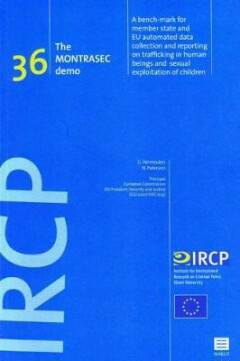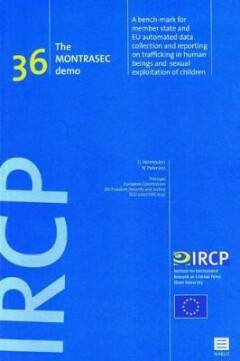
- Retrait gratuit dans votre magasin Club
- 7.000.000 titres dans notre catalogue
- Payer en toute sécurité
- Toujours un magasin près de chez vous
- Retrait gratuit dans votre magasin Club
- 7.000.0000 titres dans notre catalogue
- Payer en toute sécurité
- Toujours un magasin près de chez vous
The Montrasec Demo, 36
A Bench-Mark for Member State and Eu Automated Data Collection and Reporting on Trafficking in Human Beings and Sexual Exploitation of Children (Ircp Series Vol. 36)
G Vermeulen, N Paterson
46,00 €
+ 92 points
Description
Recent European Union policy discussions have again highlighted the urgent need for consistent recording and analysis of data relating to trafficking in human beings. Without such a framework, the EU's ability to assess the scale and nature of the problem and, consequently, to formulate effective policy responses is severely impaired. MONTRASEC - a model for monitoring trafficking in human beings, as well as sexually exploited and missing children - demonstrates that real progress can be made in addressing these long standing difficulties. Building on the work undertaken in the previous SIAMSECT (Statistical Information and Analysis on Missing and Sexually Exploited Children and Trafficking) research, a practical IT tool has been developed by which the three phenomena can be described, interpreted, and analyzed in an integrated and multidisciplinary fashion. The IT tool also provides National Rapporteurs or similar mechanisms with enhanced and uniform reporting capacity. Recognizing the EU's emerging policy line, the MONTRASEC IT tool provides a building block by which the European Commission or a future European Monitoring Centre on Trafficking in Human Beings can make horizontal comparison between the reports of the Member States. This book describes how a workable IT tool - with contents based on international legal instruments and definitions concerning the three phenomena - has been designed and tested by a range of operational agencies in two separate EU Member States. Critical questions relating to compliance with both Member States and European data protection and privacy legislation are addressed, alongside the need to ensure the highest possible levels of security for sensitive personal data relating to both victims and authors. Furthermore, a CD-ROM is included, containing a live demonstration of all the features and functions of the MONTRASEC IT tool. The MONTRASEC Demo shows that it is actually possible to move beyond theoretical discussions concerning data collection to a point where agencies operating in the field are prepared to work within a unified and consistent data collection regime, inputting live data which can thereafter be analyzed at the Member State and EU level. The book is essential reading for EU policy makers, judicial and law enforcement authorities, and organizations working in the fields of trafficking in human beings, and in the field of sexually exploited and missing children, both in the EU and in a broader international context. It will also appeal to the research community and anyone with an interest in justice and home affairs or criminal policy initiatives in the EU.
Spécifications
Parties prenantes
- Auteur(s) :
- Editeur:
Contenu
- Nombre de pages :
- 156
- Langue:
- Anglais
- Collection :
- Tome:
- n° 36
Caractéristiques
- EAN:
- 9789046603260
- Date de parution :
- 15-02-10
- Format:
- Livre broché
- Format numérique:
- Trade paperback (VS)
- Dimensions :
- 157 mm x 236 mm
- Poids :
- 294 g

Les avis
Nous publions uniquement les avis qui respectent les conditions requises. Consultez nos conditions pour les avis.






